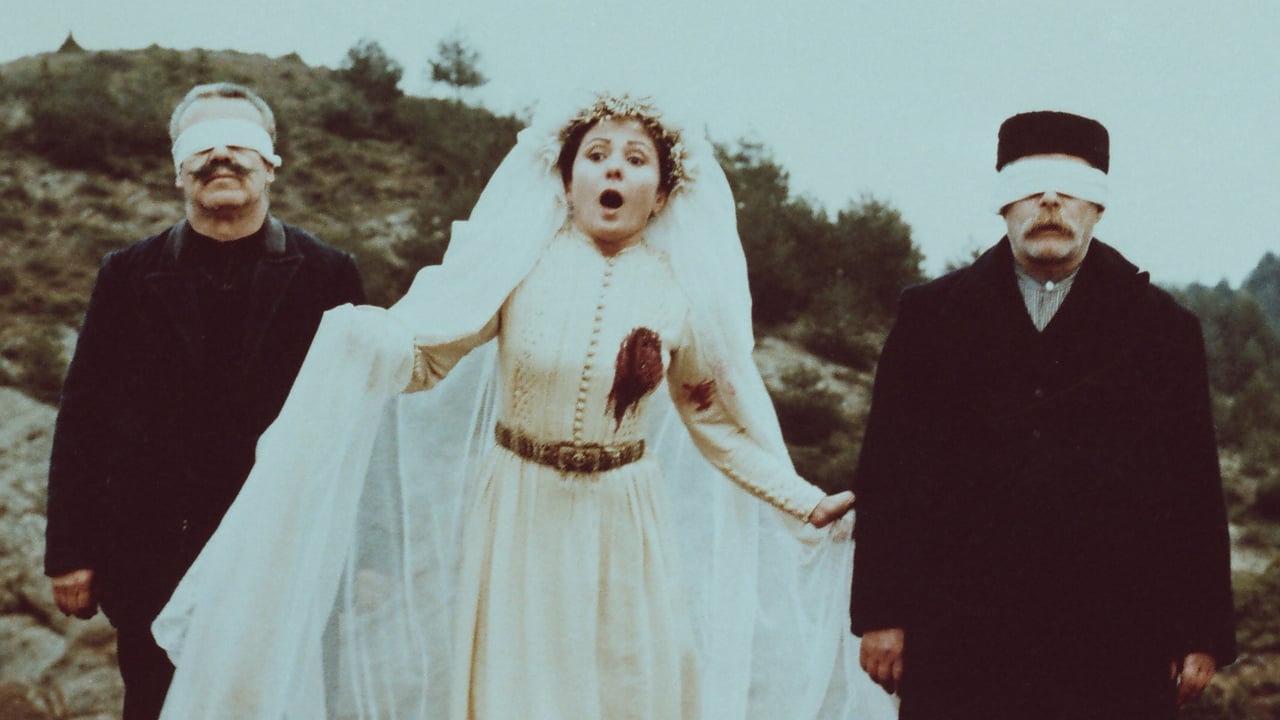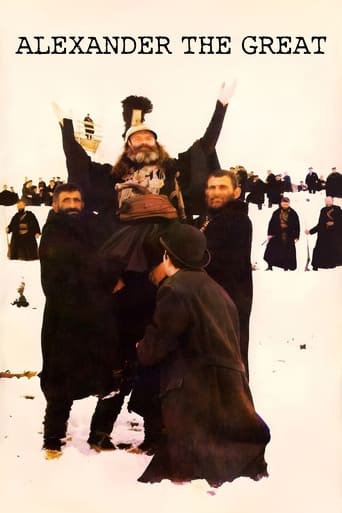

The more I see of Theo Angelopolous' work the more convinced I am that he was possibly the greatest director in the history of the movies and yet at almost 3 1/2 hours long "Alexander the Great" is not an easy film to sit through. You know while watching it that he could have made a much shorter film if he had wanted to without sacrificing any of the plot but Angelopolous is a man who likes to hold shots even when nothing much is happening in them; in other words he gives you time, (and lots of it), to take in the action or lack of it. This, like so much of his work, is a film told almost entirely in images rather than words and every shot is composed for the maximum dramatic effect. Working again with cinematographer Ghiorgos Arvanitis there are images here as fine as any in cinema. Even if the film does seem overlong it is always visually stunning. The Alexander of this film isn't the great Greek warrior but a bandit who has kidnapped a party of English aristocrats and holds them to ransom while at the same time taking over the village commune in the mountains where his presence is virtually that of a warlord. As with other Angelopolous political films this, perhaps unfortunately, tends towards the polemical rather than the dramatic. The aristocrats, for example, are used purely as props and even Alexander himself is more of a figurehead rather than a character in his own right. Angelopolous' habit of shooting mostly in long-shot means we never get close enough to any of the characters to really get to know them. Here we have a film in which there are only groups rather than individuals and narratively this is a difficult film to follow. Time and again I lost track of who was doing what to whom. Perhaps this is why, however great the film looks, it is never the historical epic that say, Visconti's "The Leopard" was. Yet this remains a considerable achievement. Films, particularly epics, this rigorous don't come along very often. This is a film that demands a great deal from its audience but stick with it and you will be amply rewarded. Like all of this great director's work it is a film you will take with you and brood over for a very long time. It may not be his greatest film but even Angelopolous working just below his best is still stands head and shoulders above his contemporaries.
... View MoreContinuing his epic explorations of Greek history in the 20th century, Angelopoulos goes back to the turn of the century, where a charismatic rebel leader calling himself "Alexander the Great" takes a handful of visiting English upper class young lords and ladies hostage, in an effort to win back the land that was taken from the farmers by and bankers. But, of course, in an Angelopoulos film things are always more complex than they first seem, and Alexander, while charismatic, is also madly ego driven, and encourages a cult of personality around himself. Returning to his home village, which is experimenting with Utopian Communism and shared wealth, Alexander is seen first as a hero, fighting to help the people achieve their dream society, but eventually he becomes a tyrant as cruel and arbitrary as any master. This is a central theme Angelopoulos is exploring. Creating Utopian socialist societies almost always demands people of power and military action, but those same people (almost always male) almost inevitably corrupt the experiment because of the nature of who they are. The very thing that makes them enablers of a new order also dooms them to destroy it. This film has a much more straightforward narrative than Angelopoulos' 2 preceding 'history' masterpieces; "The Traveling Players" and "The Hunters". Unlike those films, It doesn't jump around in time, and we stay pretty focused on this one specific incident, in this one specific village. And there is a downside to that. At 3 hours and 19 minutes, the film isn't complex enough to stay as fascinating as its progenitors. It's full of great images and wonderful, often painfully tense scenes. But on a meta level it's pretty easy to guess where it's all going, and it can get frustrating waiting for it to get there. Still an excellent film, partly based in truth (although the incidents actually happened in the 1870s), but it lacks the multi-layered magic of the two films that proceeded it. It also is generally far more naturalistic, so that when the magic and surreal suddenly come up, they can feels out of place and un-integrated. One thought. It's very interesting to compare this and Bertolucci's "1900", which I just re- watched recently. They are both long, epic films by European masters set at the turn of the century, and exploring the class struggle, and the domination of the farmers and workers by bigger more powerful forces. Both are very strong films. "Alexander" is the more subtle, complex, intellectual, and thought provoking, "1900" the more entertaining and emotional. Both are flawed,but well worth your time.
... View MoreWhilst being both the most visually and audibly haunting Angelopoulos film, I will remember it more so for covering most of the thematic concerns of Angelopoulos in his 40 years of film making:The troubling foreign involvement in Greek political and cultural affairs The failure of the Greek government to respond effectively to the crises presented before it The rise and fall of the communistic ideal and the cult of personality The burdens of the historical past upon individuals in the presentThe deconstruction of the foreigner as savior (Oedipus, St. George, Kolokotronis, Jesus, Alexander) The personal cost of living amidst contested geographic, political and moral borders Journeying as a metaphor for the search for meaning The nihilism in modernity and the struggle to forge a new way forwardIt's not his clearest or most coherent film, and probably shouldn't be watched until one is familiar with 'smaller' Angelopoulos pieces, but it is the film that resonates with me the most after having seen his body of work.
... View MoreOh man! I hope I am NOT the 41st person in IMDb who get to this film. This was the Winner of Golden Lion and FIPRESCI Prize in Venice! This film is not about Alexander the Great(356-323 BC), but a mysterious rebellion in the beginning of the 20th century in Greek. It is full of extremely graphic beauty, wonderful scene attempting, imaginative symbols, and, of course, convincing long takes. Even better than the heavenly Ulysses's Gaze. It is said to be the successor of the trilogy Days of 36, The Travelling Players and The Hunters, but to enjoy this film one does not have to take a Greek History lesson first, seeing this film would at least be one of your most unforgettable visual experience, and its metaphysical power would stick inside your mind for a long long time. Highly recommended. Get hold of this when you could find it,open your DVD-Rom and your mind, and that would be a revealing journey.
... View More